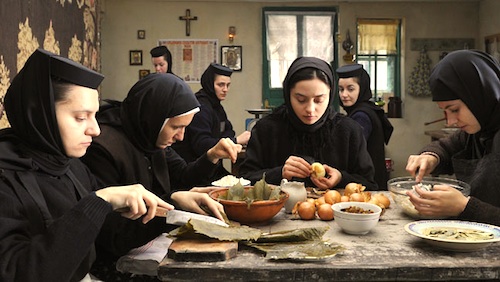By Joe Bendel. Alina is either tragically co-dependent or possessed by the Devil. Radically different measures would be required depending on the diagnosis – but either way, she will visit a host of trials upon her girlfriend Voichita and her fellow Orthodox convent residents in Cristian Mungiu’s Beyond the Hills (see clip above), Romania’s latest official best foreign language Oscar submission, which screens as part of the main slate of the 50th New York Film Festival.
Meek and pious, Voichita appears perfectly suited to a cloistered life. Alina is a different story. However, since her former friend has no real family, Voichita arranges for her to stay temporarily in her quarters. Yet as soon as she arrives, Alina starts badgering her former friend to leave with her (see clip above). Gently rebuffing her, Voichita watches in alarm as her visitor’s behavior becomes increasingly erratic and disruptive, eventually manifesting in several public meltdowns. The priest and the nuns do not want to abandon a soul in need, but after the medical establishment washes their hands of Aline, there seems to be only one remaining course of action: exorcism.
Mungiu implies a great deal in Hills, very definitely including the nature of Aline and Voichita’s relationship, while leaving just as much open to interpretation. It would also have been very easy to portray the priest and good sisters as stereotypical zealots dangerously convinced of their own infallibility. However, Hills constantly reasserts the messy humanity of each character. In fact, the ambiguity of the “possession” gives the film quite a distinctive flavor. Frankly, after about two hours of Aline acting out, most viewers will be ready to throw their lot in with the nuns, holding down the devil-woman as the priest reads the purification scriptures over her.

With a running time of 150 minutes, Hills often feels like what it is: a product of the Romanian New Wave of independent filmmaking. It probably would not have killed anyone had Mungiu shaved off twenty minutes or so. Nonetheless, he elicits several riveting performances, the most notable being Cosmina Stratan as Voichita, the confused innocent. As Alina, Cristina Flutur is also scarily convincing engaging in all manner of aggressive, self-destructive behavior. Yet it is Valeriu Andriută’s work as the priest, simultaneously severe and sympathetic, that really forestalls snap audience judgments.
Based on a novelized account of a real life incident in Moldova, Hills is not a kneejerk attack on Eastern Orthodoxy. Nonetheless, as the Russian Orthodox Church hemorrhages international credibility due to its perceived alliance with the Putin regime, it is hard not to invest Hills with an additional layer of meaning, whether or not Mungiu intended it. Given its ambiguous but evocative treatment of monastic life and supernatural possession, Beyond the Hills would be a fascinating film to see in conjunction with Jerzy Kawalerowicz’s Mother Joan of the Angels. Challenging in multiple ways, Beyond the Hills is recommended for hardy cineastes with at least a couple of Romanian New Wave films already under their belts when it screens tomorrow (10/1), next Sunday (10/7), and the following Thursday (10/11), as part of the 2012 NYFF.
LFM GRADE: B+
Posted on October 1st, 2012 at 11:52am.